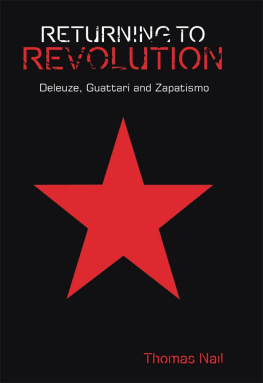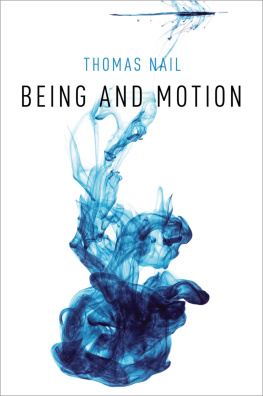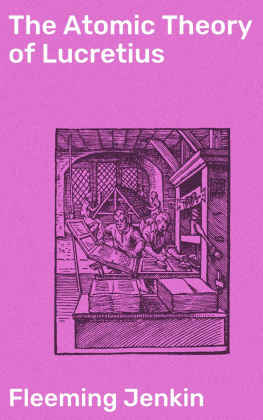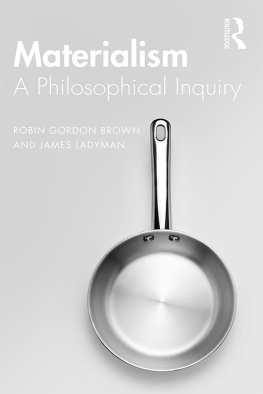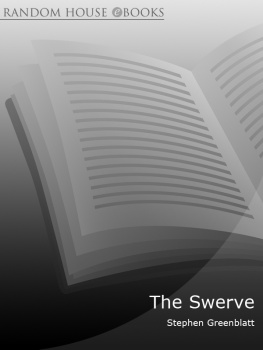Lucretius I
An Ontology of Motion
Thomas Nail

For Katie
Edinburgh University Press is one of the leading university presses in the UK. We publish academic books and journals in our selected subject areas across the humanities and social sciences, combining cutting-edge scholarship with high editorial and production values to produce academic works of lasting importance. For more information visit our website: edinburghuniversitypress.com
Thomas Nail, 2018
Edinburgh University Press Ltd
The Tun Holyrood Road
12(2f) Jacksons Entry
Edinburgh EH8 8PJ
A CIP record for this book is available from the British Library
ISBN 978 1 4744 3469 0
The right of Thomas Nail to be identified as the author of this work has been asserted in accordance with the Copyright, Designs and Patents Act 1988, and the Copyright and Related Rights Regulations 2003 (SI No. 2498).
Contents
A Note on the Translation and Text
All quotations and citations from De Rerum Natura are cited from the Latin by book and line number. For English translations of the Latin I have followed Walter Englerts translation, Lucretius: On the Nature of Things (Newburyport, MA: Focus Publishing, 2003), sometimes modifying it slightly, and in some cases I have left the Latin words entirely untranslated. For example, in most places I keep the Latin word corpora instead of using the English translation atom.
In my own translations and commentary I have followed P. G. Glare, Oxford Latin Dictionary (Oxford: Clarendon Press, 1982), and Charlton T. Lewis and Charles Short, A Latin Dictionary: Founded on Andrews Edition of Freunds Latin Dictionary (Oxford: Clarendon Press, 1879).
This book is the first volume in a projected three-volume work on De Rerum Natura. The aim of this ambitious project is to bring Lucretius back into serious conversation with the contemporary world and provide a historical foundation for a new philosophy of movement. Each volume is structured as a close reading and commentary on two books from De Rerum Natura. Volume I focuses on ; volume II focuses on Books III and IV; and volume III focuses on Books V and VI. Each volume builds on the previous ones and together they provide a new materialist and kinetic theory of a range of areas including ontology, physics, epistemology, aesthetics, politics, ethics, history, and meteorology.
Acknowledgements
I am indebted to a number of people for their support and encouragement of this project. Before writing this book, I had read a number of scholars who referenced Lucretius as an important historical figure in relation to movement and new materialism, but the first true believer I actually met was Ryan Johnson. He was the only person I knew personally who was as excited as I was about the importance of Lucretius, and he generously shared, and continues to share, a number of excellent resources including an early draft of his own book, The Deleuze-Lucretius Encounter (Edinburgh University Press, 2017). He also introduced me to the work of Brooke Holmes, whose inspiring scholarship on Lucretius set a very high standard for further scholarship in the field.
Without the support and encouragement of a number of my close colleagues in Denver particularly Josh Hanan, Chris Gamble, and Robert Urquhart I would not have felt bold enough to write this book. In a world in which Lucretius is rarely taught in philosophy, and largely thought to have nothing of much importance to say about contemporary philosophy or physics, this group made me feel sane.
The year I wrote this book I taught a class at the University of Denver entitled Philosophy and Fiction, which, much to the students surprise, consisted entirely of a close reading of of De Rerum Natura in Latin! By week three we had only read the first fifteen lines, and the group of students in our classroom was significantly smaller. I am absolutely grateful to all the undergraduate and graduate students who rose to the challenge, trusted this crazy idea, were patient, studied the Latin, and ultimately contributed to the ideas in this book.
In the publication of this book I am grateful to the extremely detailed and generous feedback given to me by my anonymous reviewers. They helped make this book better than it was. I thank Edinburgh University Press, and in particular Carol Macdonald for her support and excitement about this daring project, as well as for her kindness, to which everyone who has worked with her can attest.
Finally, I would like to thank my family and especially my wife, Katie, for her continued support, feedback, and editorial direction on parts of this project. They are the material conditions without which this work would not have been possible. I am also grateful to Kim and Lane Riddle for taking us to the South Carolina coast, those other material conditions, on whose shores I first read De Rerum Natura: a book best read on the beach in the wind.
Introduction
The ancient atom is entirely misunderstood if it is overlooked that its essence is to course and flow.
Gilles Deleuze
The time has come for a return to Lucretius. A text that was lost for over a thousand years is today once again collecting dust on the bookshelves, read only as a historical document that once inspired an outdated scientific revolution. The first-century Roman poet, whose famous didactic poem De Rerum Natura was single-handedly responsible for the reintroduction of Greek atomism into Western thought and its influence on the modern scientific revolution, has now decidedly fallen out of favour. The present book is the first attempt in a long time to reinterpret this classical text as an absolutely contemporary one: a Lucretius for today.
The Decline of the Atom
De Rerum Natura has been abandoned as a contemporary text because a number of key modern atomist tenets have now been proven scientifically and philosophically untenable in light of twentieth-century discoveries in physics.
First, and most importantly, the core atomist thesis that all of reality is made up of discrete, indestructible, and indivisible atoms can no longer be upheld. Beginning with the discovery of electrons in the late nineteenth century and culminating with the discovery of other subatomic particles, the splitting of the atom, and the discovery of quantum fields in the twentieth century, it is no longer possible to maintain a philosophical or scientific belief in the core tenet of Greek atomism. The twenty-first-century scientific consensus is now that of quantum field theory: that all particles are fluctuations or effects of more primary field processes.all its historical influence and prescience regarding the discovery of the atom, the ontological core of modern atomism remains fundamentally mistaken about the nature of reality as we know it today.
Secondly, and correlatively, the modern atomist commitment to materialism remains fundamentally flawed. The modern interpretation of Greek atomism, primarily based on Lucretius De Rerum Natura, remained committed to a version of materialism defined by at least three core aspects: discreteness, observability, and mechanistic causality.
Discreteness. For modern materialism, all of being is made of matter and all of matter is defined by discrete particles of three-dimensionally extended physical stuff. The particles of matter move around, but with respect to their own self-identity they remain unchanged. Matter can be divided up into smaller and smaller particles, but matter will always be nothing other than the sum total of divided discrete particles with extension in space.


